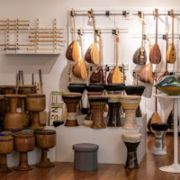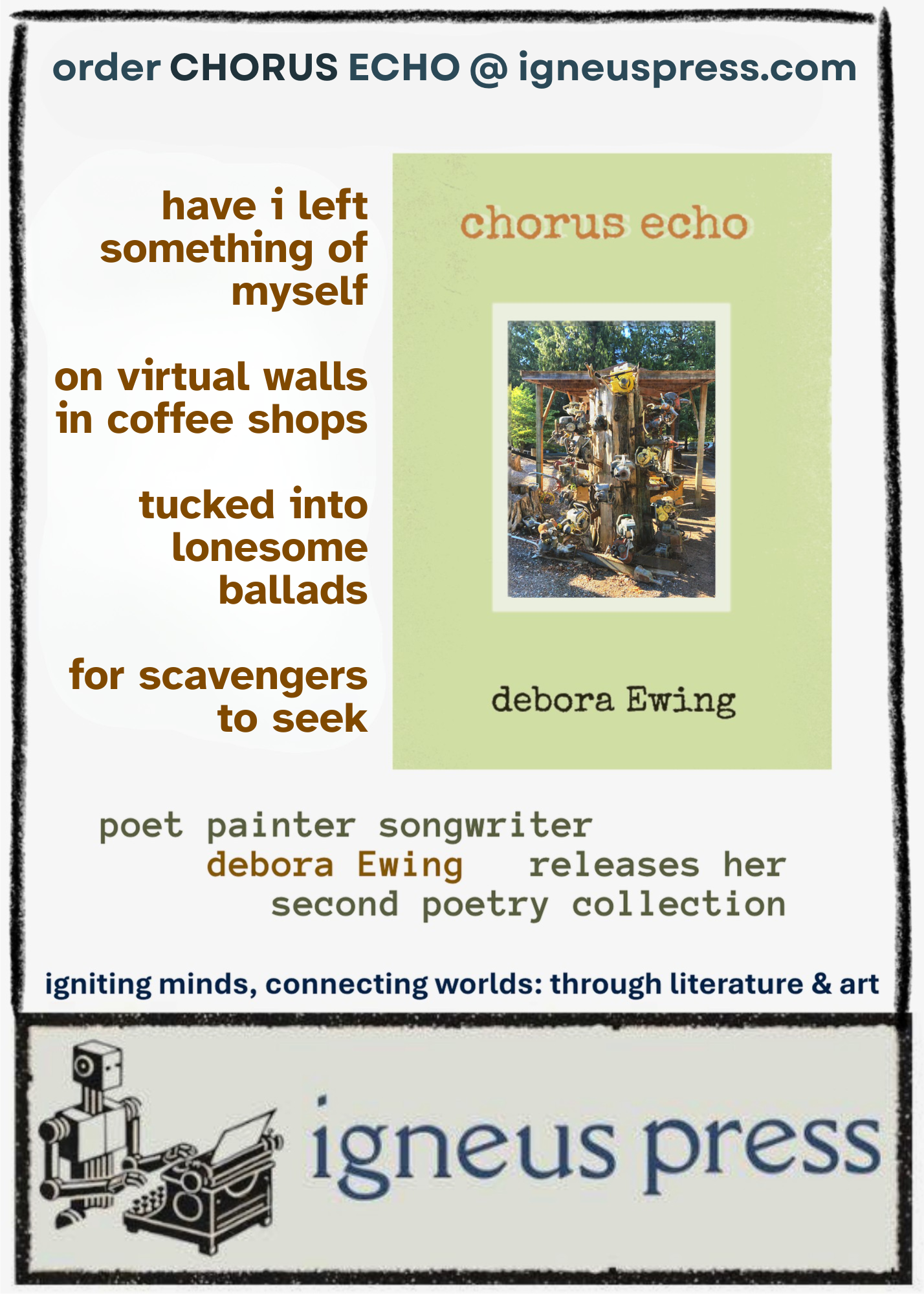SALA MUZIK: The Near East comes to Hollywood
A Profile and Interview with Founder and Proprietor, Veysel Sala
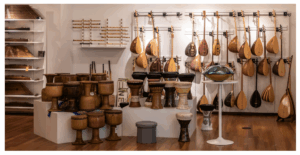
South Wall: Persian Santoors, PersianTombaks & Turkish Saz
If you play any type of Near Eastern music, you have probably heard of and even made a few online purchases in recent years from salamuzik.com. Sala Muzik is one of very few, reputable, online sources for those of us in the Americas and abroad trying to source traditional string, wind and percussion instruments along with replacement parts and strings. Prior to this, most of us either travelled to these places or enlisted a network of musician friends and acquaintances to purchase and hand carry fragile musical instruments, of often dubious quality, back from far flung places like Istanbul, Skopje, Yereven, Sophia, Beirut, Athens, Tehran, etc.
Sharing my own experience from several decades ago, we travelled to Bulgaria and Macedonia where we had the assistance of local, traditional musicians. However, I was also on a mission to purchase a quality Aşik Saz and various Neys on a three day side trip to Istanbul, Türkiye. A few musical acquaintances directed us to a tiny, dusty shop on “Music Street” near Taksim Square where I was told the proprietor spoke a little English and carried quality instruments. Crammed floor to ceiling with various traditional musical instruments, this was nothing short of magical. I have dreamed of this tiny shop for decades until this April when I received an email from a good friend and salamuzik.com announcing that Sala Muzik had just opened their first shop outside Türkiye, here in Los Angeles, and literally on the Hollywood Walk of Fame! We visited a week later and met the owner Veysel Sala and sister-in-law Sarah who insisted we enjoy a cup of strong Kurdish tea while we shopped.
The Sala shop is immaculate and huge; what should properly be called a showroom. The variety and volume of various traditional musical instruments is staggering to put it very mildly. There is a dizzying array of Turkish, Arabic, Kurdish, Armenian and Persian string, wind and percussion instruments. I can’t begin to do this justice but will share that Sala carries a wide variety of Turkish, Arabic, Armenian and Persian Ouds; Kurdish Tembûr, Persian Setar and Tar, Kanun/Qanun, Santoor, Saz of every size and many hard to source regional string instruments as well as both fretless and microtonal guitars. Also, a nice range of end-blown Ney and Kaval flutes as well as double-reeded Zurna and Duduk shawms. Lastly, there is a huge offering of traditional percussion instruments including Persian Tombak, Turkish and Arabic Darabuka (aka “dumbek”) and numerous frame drums including Arabic Riqq, Azeri Dajre, Turkish Bendir, and a variety of Kurdish and Persian Daf.
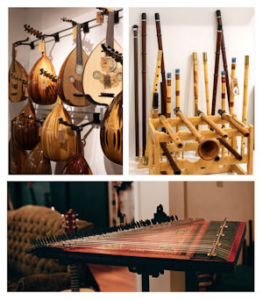
Clockwise from top left: Ouds; traditional wind instruments (Kaval, Ney, Zurna & Duduk); & Kanun/Qanun
A few weeks ago, I had the opportunity to sit down with proprietor Veysel Sala for a short interview:
PS: Do you come from a musical family?
VS: No, I did not grow up in a musical family. When I first began this journey, no one around me played instruments or worked in music. But something beautiful happened once I started working with traditional instruments—my family slowly began to take an interest. Today, my younger brother is becoming an incredible luthier, and I truly believe that within a few years, he may be considered among the best in the world. So, in a way, music has grown roots in our family through this business
PS: Where is your family originally from?
VS: My parents are Kurdish. They migrated from Iranian Kurdistan to Turkish Kurdistan during the time of the Iranian Revolution. I grew up in a large family with eight siblings, and honestly, I consider that a blessing. In Kurdish culture, large families are common and foster a spirit of sharing, community, and support. While life in Kurdistan comes with many challenges—social, economic, and political—I prefer not to focus on the negative. Instead, I carry with me the strength, resilience, and deep sense of belonging that our culture instills.
PS: How did Sala Muzik begin? What inspired you to start it?
VS: Sala Muzik started not as a business plan, but as a twist of fate—and maybe even love.
Back in 2010, I was a university student in Istanbul. I had a crush on a woman who didn’t quite return my feelings. I was constantly trying to find ways to impress her, and with her birthday approaching, I wanted to buy her something special. She had a beautiful singing voice, so I thought a Daf—a traditional Kurdish frame drum—would be the perfect gift.
I searched everywhere in Istanbul but couldn’t find one. I even looked online and contracted shops in other cities, but still no luck. Eventually, a friend told me that Dafs are handmade in Iranian Kurdistan and could be brought across the border. Since my hometown, Hakkari, is right next to Iran (like San Diego to Tijuana), I contacted a friend and asked if he could bring one for me. Within a few days, I had it in my hands.
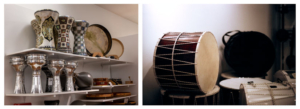
Left: Darabukas & assorted Frame Drums. Right: Tupan/Davul
It was stunning—more than an instrument, it was like a piece of art. I couldn’t believe something so beautiful was so hard to find. Before giving it to her, I took a photo and listed it on Amazon. A few hours later, it sold. I was shocked—after six months of struggling to sell anything on Amazon, this item sold within hours!
But there was a problem: I had just gifted it to her. So the next day, I met with her, explained the situation, and asked if I could take it back just to ship it. She looked at me in silence, placed the Daf on the table, and walked away. I lost the girl—but I had found something even more meaningful.
I shipped the Daf, ordered two more, and before they even arrived, they sold as well. I kept doubling my inventory. Eventually, a customer emailed me asking if I also sold a Santur (a hammered dulcimer). I had never heard of it, but I said yes, sourced it, and sent it to them. Then another customer asked for a Turkish Oud. Again, I had none in stock but found a local maker, took a photo, and sold it. So my journey began with no training, no musical background, and no plan. Just curiosity, hard work, and a love for traditional instruments.
Over time, the purpose of Sala Muzik evolved. What started as a student’s side hustle turned into a mission. Today, one of our goals is to support disadvantaged Kurdish regions in Eastern Türkiye by opening instrument-making workshops. In many of these areas, people work for as little as $100–$200 a month. We want to change that. Our biggest dream is to build the world’s largest instrument workshop in Hakkari and turn the city into a cultural and musical hub. It’s a huge challenge—financially and logistically—but we believe in it deeply and are always open to collaborators who share this vision.
PS: How many Sala shops are there and where?
VS: We currently have three retail locations: One in Üsküdar (Asian side of Istanbul); another in Karaköy (European side of Istanbul); and our newest flagship store, here in Hollywood, California. In addition to these, we also run three instrument-making workshops.
PS: Why did you decide to open a shop in Hollywood?
VS: 60% of our total sales are from the United States, and nearly half of that comes from California. It became clear that we needed a physical presence here. We weren’t sure where in California to open, so we asked our customers directly. We emailed 6,000 of our past California customers and asked for their suggestions. The most common responses were Los Angeles and Hollywood. So we followed their advice and found a space right on the Hollywood Walk of Fame, next to the Dolby Theatre and close to UCLA and the heart of the music industry.
PS: How has your experience at the Hollywood location been so far and who is your customer base?
VS: This shop has become one of our most successful and fulfilling projects. We’ve met incredible people—including you, Pat! Many customers who had previously bought from us online are now walking into our store, sharing ideas, and offering amazing feedback. It has also allowed us to engage more with Western musicians. We’re constantly exchanging ideas about how to blend Eastern and Western musical traditions. Every day brings something new—new knowledge, new energy, and new connections.
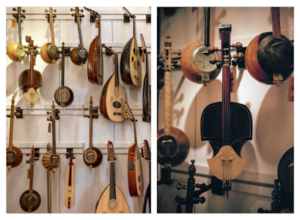
Left: Assorted Persian Kamanche, Turkish Lavtas & Ouds. Right: Persian Ghaychak
We serve a diverse group. Many of our customers are from Middle Eastern backgrounds—Kurdish, Iranian, Armenian, Turkish, Arabic—but we’ve seen growing interest from American musicians too. They’re often looking to expand their sound and incorporate new textures into their music. Among the most popular instruments for our American customers are the Oud, Microtonal Guitar, Fretless Guitar, and Darbuka.
PS: Lastly, can you tell us a little about your TED Talk?
VS: That experience was unforgettable. A TED curator had heard my story and visited our shop in Üsküdar to learn more. After I told him everything, he said, “I’ve heard thousands of stories—this is one of the top three.” I was humbled. I agreed to speak, even though I don’t have the academic titles the other speakers had. I shared how Sala Muzik began, and our dream of transforming Hakkari into a city of craftsmanship and music. My talk was one of the most appreciated of the event, and to this day, it remains one of the most meaningful experiences of my life.
In closing, Sala’s Hollywood location is a genuine goldmine for interested musicians wanting to actually see and play a variety of musical instruments that you just can’t find in person. Veysel, Sarah and the staff are all incredibly welcoming, knowledgeable and patient.
Sala Muzik is located at 6801 Hollywood Blvd Suite 125 Hollywood, CA 90028 and online at salamuzik.com. Definitely a must, whether you are a local Angeleno or planning a visit to the greater Los Angeles area. Give Veysel a hardy Kurdish “Silav!” and tell’m FolkWorks sent you!
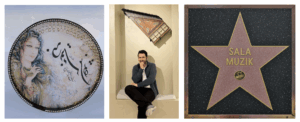
Kurdish Daf; Veysel Sala with Kanun; Sala Hollywood Walk of Fame Star (above 3 photos courtesy Sala Muzik)
Pat Mac Swyney is a Los Angeles based musician and teacher who plays Trad. Jazz with The Swing Riots Quirktette; Balkan and Near Eastern with Nevenka and Pečurka; Old-Time with Sausage Grinder; and Irish with The Dirty Mickeys
Jake Bluenote plays guitar and various traditional instruments with The Hot Club of L.A., Swing Riots, Nevenka, Pečurka, The Dirty Mickeys and is one of the most sought after traditional guitarists in the greater Los Angeles area.
SALA MUZIK: The Near East comes to Hollywood
A Profile and Interview with Founder and Proprietor, Veysel Sala

